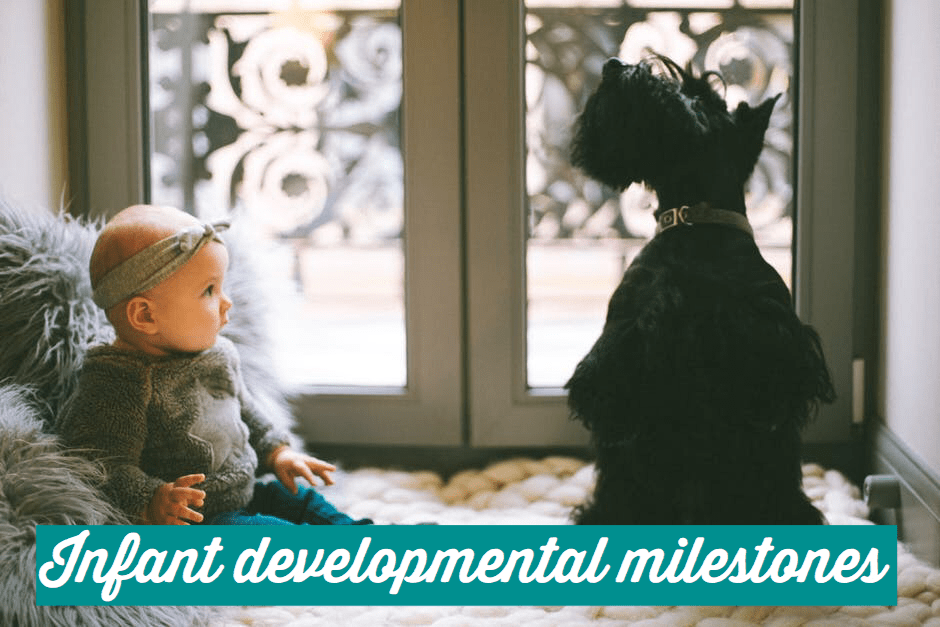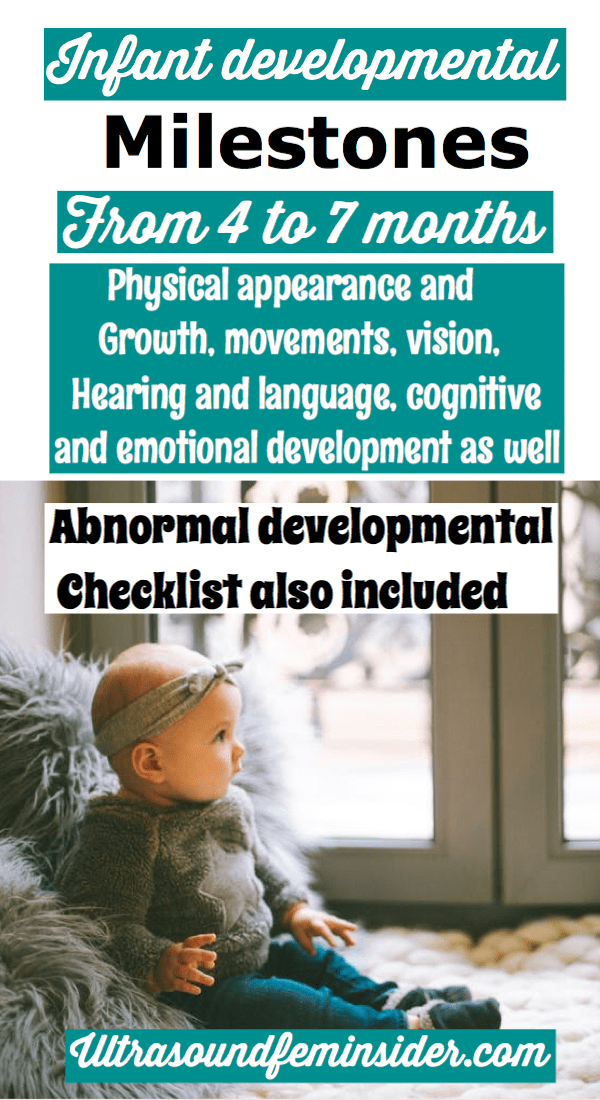These months will be glorious for you and your baby because in this period your baby’s personality emerges, and the laughter, giggles, joy and the wonder begin. Every day you will have new achievements and surprises to keep up with. In this post we will talk about Infant developmental milestones 4 to 7 months. and I will also include a checklist of the milestones. and normal development such as Physical appearance and growth, body normal development milestones such as: movements, vision, hearing and language, and finally cognitive and emotional development, you’ll also find a list of abnormal development to keep in mind. Ready? Let’s get started.

After 4 months of your baby’s life, you probably already have daily routines established for your baby. These daily routines for feeding, napping, bathing, or going to sleep, will provide your baby with the predictability that will help him feel safe and comfortable. These routines will also allow you to manage your time and will help you to provide to your baby with activities and a schedule for everything, and even to intersperse your own routines and needs.
At this time, significant changes will be occurring in your baby. In this period, your baby will be able to develop the ability to use the senses of vision, touch, communication or language, hearing, etc. In addition to developing the ability to communicate more effectively their feelings, desires, and emotions through crying, laughter, gestures, etc.
At this time your baby is also developing a strong attachment for you and the other people who take care of him. In these months you will also be able to realize that your baby is unique, that there is no perfect formula for raising your children, that all babies are unique and different.
Infant developmental milestones 4 to 7 months.
Infant developmental milestones, Physical appearance, and growth.
Between months 4 and 7, your baby will continue to earn approximately one pound to pound and a half every month, for the time that your baby reaches 8 months old should weigh twice as much as birth weight.
The bones are growing rapidly too, as a result of this growth, in this period your baby should grow approximately 2 inches the body and 1 inch the head every month as well.
Growth is average among all babies. In any case, being on the lookout is always beneficial, so you can take action and check with the pediatrician if necessary.
Normal infant movements.
During the first 4 months of life, your baby will develop the muscle control required to move the eyes and head to follow interesting objects. He will also achieve one of the biggest challenges, which is: Sit down. This challenge will be achieved gradually when the back and neck muscles become strong enough, and when the necessary balance is developed in the trunk, head, and neck.
Your baby will develop the ability to lift his head and keep it up while resting on his abdomen. All these skills that usually develop at 5 months, and are a necessity for rolling over and crawling, activities that he must be doing at the end of this period.
At 4 months your baby will be able to bring interesting objects to his mouth. At 5 months your baby will begin to discover his fingers and bring them to his mouth too. And at the end of 7 months, your baby will be capable of transferring objects from one hand to the other.
The physical coordination of your baby also improves dramatically during this period, your baby will begin to discover different parts of his body that he did not even know existed. So lying on his back your baby can now grab his feet and toes and bring them to his mouth. In the sitting position, your baby can now touch his legs, knees, etc. At this time your baby also begins to feel new sensations and begins to understand the function of different parts of the body.
The movements milestones chart from 4 to 7 months!
- Rolls both ways (front to back and back to front).
- Sits with, and gradually without the help of the hands.
- Support his whole weight on the legs.
- Reaches with one hand.
- Transfer objects from one hand to the other.
Normal infant developmental milestones for Vision.
Although your baby was able to see from birth, the total vision ability takes several months to fully develop. At the beginning of this period of 4 to 7 months, it is when your baby can distinguish the different shades of reds, blues, and yellows. Like colors, it happens for geometric shapes, in this period is when your baby begins to distinguish more complex patterns and shapes.
By 4 months, your baby’s vision range begins to expand to several feet, sometimes even more. and will continue to expand all the way to 7 months.
The ability to follow objects in rapid movement with the eyes develops as well, as a result of a development in the coordination of the eyes.
Different activities are important to increase the visual development of your baby, activities such as reading books with different colors and patterns, excursions, being in contact with nature, going for a walk, and one of the most fascinating for infants in this age, look at himself in a mirror. These are all important things you can do to keep your baby learning and developing properly during this period.
Visual milestones chart from 4 to 7 months!
- Full-color vision finally develops.
- Vision from various distance matures.
- Ability to track moving objects.
Normal newborn developmental milestones for hearing and language.
The development of hearing and language begins early. From birth, your baby begins and learns to distinguish between the different pitch and levels of your voice.
By 4 months, your baby begins to notice the different ways in which you speak and the individual sounds you make. At this early stage, your baby will start listening to the vowels and consonants and begin to notice the way these combine into syllables, words, and sentences.
From the very beginning your baby begins to make sounds, first in the form of crying, then in the form of coos, and gradually begins to start to babble by the age of 4 months.
The role of caregivers for language development on infants at this time is very important. Encourage your child to speak throughout the day, repeating his sounds, and interspersing more defined sounds. At the age of 6 to 7 months, your baby begins to mimic your speech sounds. This is the perfect time to introduce simple syllables words to the development of your baby’s language, words like baby, cat, dog, go, hot, walk, cold, well, mom, dad, yes, etc.
If your baby does not imitate any sound at 7 months you should check with the pediatrician, because it may be due to a problem with hearing or speech development.
Hearing and speech milestones chart from 4 to 7 months.
- Respond to his/her own name.
- Begin to respond and understand the word ” No”.
- Distinguishes emotions by the tone and sound of the voice.
- Respond to sound by making his own sounds.
- Uses his own voice to express joy and anger or displeasure.
- Babbles chains of the consonant.
Enjoying the post so far? Why not pin it?

Cognitive development from 4 to 7 months.
Many of the first-time parents often ask themselves if their babies understand what is happening around them. And this is a very valid question, let me tell you that there are studies that have proven that babies learn from the moment they come into the world.
In this period of time, you will notice that your baby’s memory and attention are increasing, and therefore you begin to notice that your baby not only absorbs information from you but also applies all that knowledge in his daily life.
During this period of 4 to 7 months, the most important concept your baby will learn is cause and effect. you will learn that if you throw an object to the floor it makes a noise, that if you kick the mattress in the crib it vibrates etc. This is the time where your baby will discover the sounds, and will do everything possible to test them, and will be very attentive to the audience that is watching, mainly their funny faces, groans and other reactions of approval or disapproval.
Also, your baby will be learning at this time that the world is more permanent than he thinks, games like peekaboo will teach them that because we do not see an object does not mean that it has vanished, this principle is known as “object permanence”.
Emotional development from 4 to 7 months.
Between 4 and 7 months your baby is going to experience an important transformation in terms of personality. The most important aspects of your baby’s personality will be dictated by his temper. Many new facets will begin in this period, a wide variety of behaviors from easy going to easily upset, or from headstrong to compliant, you name it.
In this period, your baby begins to have more control over his movements, and it will be important to get to things, although he often needs your help and will let you know with a shout.
Always keep in mind that your baby’s personality is as unique as your baby, and that hugs and talk can do wonders when it comes to calming a baby who is easily irritated.
A good technique to practice at this time is “Distraction can be your best ally to refocus your baby’s energy” let me explain: if your baby keeps crying for the toy he has thrown to the floor and that you have collected for the 10th time, let him go on the floor, so he can pick up the toy by himself, without crying.
Related posts you might like
Baby sleep training. The complete guide.
Newborn developmental milestones, first 3 months.
Normal child development at 24 months.
Normal child development by 18 months.
After reviewing everything that is part of your baby’s normal development during this period of 4 to 7 months of life, I will give you a list of things that are not normal and you should check quickly with the pediatrician. Please remember that all infants don’t develop in the same way or at the same time.
Abnormal developmental health chart to look up to from 4 to 7 months.
- Seems stiff, with tight muscles.
- When the body is pulled in a sitting position, the head still flops back.
- Usually reaches for objects with one hand only.
- Don’t like or refuses to cuddle.
- Shows no affection for caregivers.
- It doesn’t seem to enjoy being around strange people.
- One or both eyes turn in or out frequently.
- Persistent tearing, eye drainage or abnormal sensitivity to light.
- Doesn’t respond to sounds around him/her or turn the head to look for sounds after 4 months.
- Has difficulty bringing an object to his/her mouth.
- It doesn’t roll over in any direction.
- Cry inconsolably at night after 5 months.
- Doesn’t smile spontaneously after 5 months.
- Can’t sit with or without help by 6 months.
- Doesn’t laugh or make squealing sounds after 6 months.
- Don’t reach for objects after 6 months.
- It doesn’t follow objects with eyes after 7 months.
- Doesn’t try to stand or bear weight on the legs by 7 months.
- Do not babble by 7 months.
- It doesn’t try to attract attention through actions by 7 months.
- Shows no interest in games like peekaboo by 7 months.
Final thoughts about Infant developmental milestones 4 to 7 months.
Here is the list of the most important things in your infant’s development. This period is beautiful, and one of the most active ones.
Always remember if you notice something abnormal in your baby, take note and ask the pediatrician when you take the baby to the visits, during a medical visit there are many pathologies that doctors cannot detect due to the rush of time.
If this article helps you in any way don’t forget to share it. As usual thank you for reading, and I will see you next time.
Zadi, xo










Wow, looks like it’s a lot to happen soon! Thanks a lot for this little guide of yours, love it!
I was so focused on crossing 4mo point that I actually forgot to thing about next big steps. I just wanted to sleep train so badly and be rested myself somehow! Finished the training few days back (with HWL method from http://parental-love.com/shop/baby-sleep-training – amazing one!) and now I’m looking up to some new steps!
Awesome Vicky, I wish the best luck to you. As I can see you sleep train super fast, that wasn’t my first story lol, anyway keep me posted on any update and I hope you keep visiting my blog for new tips on parenting ??
[…] Infant developmental milestones. 4 to 7 months. […]
[…] Infant developmental milestones. 4 to 7 months. […]
[…] Infant developmental milestones. 4 to 7 months. […]